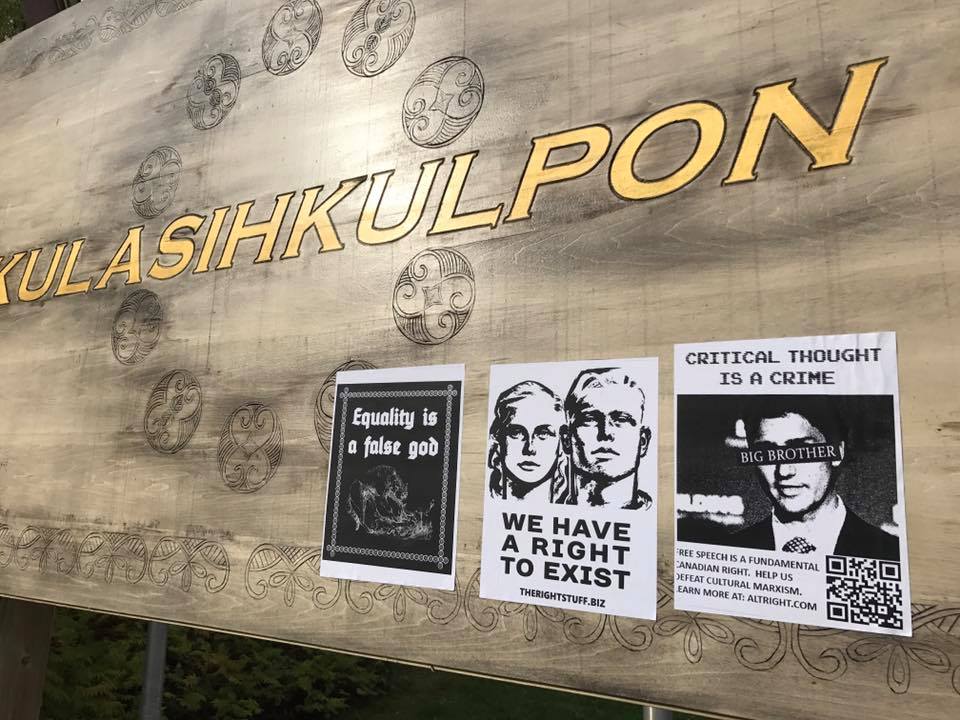
Three white supremacist posters were taped on a Maliseet welcome sign on St. Thomas University’s campus on the morning of Sept. 28.
The posters surfaced during a week of pride celebrations and the university’s first conference towards reconciliation between Indigenous and non-Indigenous communities.
First-year Indigenous student Destiny Davidson was saddened when she heard the posters had been pasted over the sign.
“I feel like they’re trying to take away the focus from pride week and the events that we’re hosting surrounding the Indigenous communities at STU, and also taking away from the diversity and equality that we promote at St. Thomas,” Davidson said.
When Sara Nason, chair of pride week, found out about the posters, she felt angry, but she wasn’t surprised.
“I had been hearing how there were a couple alt-right, white supremacist groups springing up in Fredericton,” Nason said.
“I think what we need to do is brainstorm and think what can we do to be more proactive so that these kind of things don’t happen, period.”
One poster read “Equality is a false God.” Another poster pictured a white man and a woman with the words “We have a right to exist,” accompanied by a web address for a white supremacist blog.
The third poster was of a man with a “big brother” label across his eyes. The poster also read “Critical thought is a crime” at the top and “Free speech is a fundamental Canadian right. Help us defeat cultural marxism” at the bottom of the poster.
There was a QR scan code and link in the bottom right corner directing people to a self-proclaimed alt-right website, of which American white supremacist Richard Spencer is an editor.
Jeffrey Carleton, associate vice-president communications, said the fact that the posters were placed on the Indigenous welcome sign and adjacent to the flagpoles displaying the LGBTQ and transgender pride flags this week was not a coincidence.
“We’re not going to give that kind of speech a platform,” he said.
Professor Brad Cross found the posters on campus around 8:30 a.m that day. After discovering them, Cross alerted the administration.
The university removed the posters from the sign and rounded up professors to check the rest of campus for similar propaganda. No more were found on the STU campus.
Similar posters were also found on the University of New Brunswick campus.
The university has not released an official statement regarding the posters, but the St. Thomas University Students’ Union spoke out on Friday.
“The Student Union executive has been unequivocal in our intolerance of prejudice within the St. Thomas community. We are dismayed that such bigotry has been normalized to this extent and are disgusted at this blatant display of hate and white nationalism,” Philippe Ferland, STUSU president, wrote in a statement.
“We condemn this anti-Indigenous oppression and shall continue to fight against the racist tendencies within our community. We remain committed to overcoming the barriers to decolonization on our campus. We remain devoted to the Indigenous members of this community and their inviolable right to study and live without discrimination at St. Thomas.”
Fourth-year Indigenous student Mandy Richard was heavily involved in organizing the conference toward reconciliation. She’s also a committee member on the student-led Indigenous reconciliation committee and part of the faculty committee for Indigenization of the university.
When she found out about the posters on Friday night, she said she felt disgusted.
“I had to sit and take time to process it and it wasn’t a good feeling … having that be something that actually happened,” Richard said.
However, she said the event did not trump a very powerful week.
“It was disheartening, but what’s even more disheartening is the people who did this hateful act,” she said.
“Hate is a very dark and heavy emotion and for those who carry that kind of hate in them, they’re never going to find peace and they’re never going to be truly happy.”
Carleton said the university will not tolerate this kind of messaging ruin its celebrations.
“We’ve got wonderful, interesting, progressive events happening on campus, so that’s where we’re going to put our priority, our emphasis … not in someone else’s message that aims to disrupt that,” Carleton said.
Richard said that, although a lot of people were affected and hurt by the posters, “at the end of the day this person did not win.”
“Regardless of where your own personal identity is, we’re all very resilient to bounce back from this and not let it take away from the powerful week that we did have … This effort was not powerful enough to stop our efforts to Indigenize and decolonize the school.”
